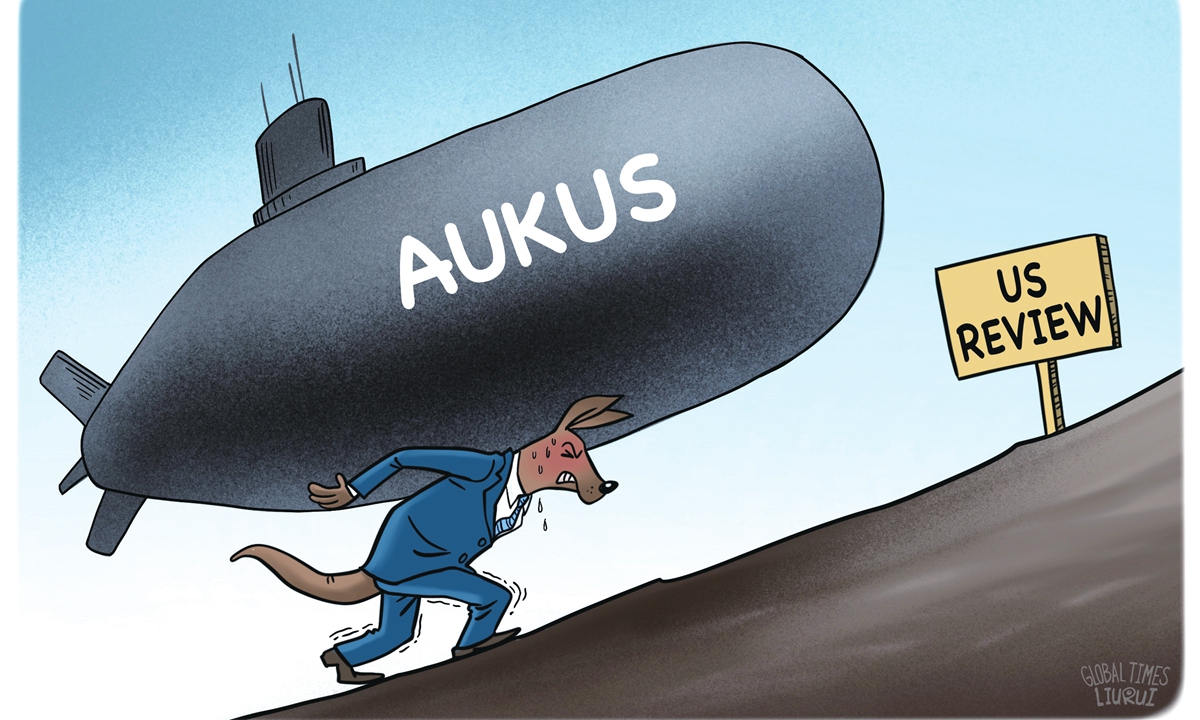
Illustration: Liu Rui/GT
Recently, some figures in Australia's defense establishment have been emphasizing regional "security risks" for clear geopolitical reasons. For instance, it was reported on November 8 by Australian media outlets that the country's shadow defense minister Angus Taylor endorsed US support for AUKUS, saying the pact is "giving Australia the capability and confidence to defend our national interest, not to escalate conflict" amid what he called "the most dangerous and uncertain times since the Second World War." Days earlier, Defense Minister Richard Marles, more blatantly, claimed that as China undertakes the "biggest military build-up in the world today," it has posed a growing threat to Australia's sea trade routes.
Australia's defense sector has now entered a phase of large-scale military expansion, with budgets at record highs and accelerated development in many areas. AUKUS, in particular, involves enormous financial costs, lengthy timelines and significant risks. Such massive military investment is a strategic gamble - one that needs justification to sell to the domestic audience - and China's development conveniently fits that narrative.
Within this strategic storytelling framework, China is cast as the "source of threat," allowing every subsequent expansion of defense capabilities to appear perfectly justified.
This "China threat" rhetoric is aimed not only at the Australian public but also at regional states and allies. In doing so, the country attempts to rally Southeast Asian and South Pacific states and to expand AUKUS' "circle of friends." In essence, Canberra is exporting its anxiety as a diplomatic asset, leveraging fear to advance its regional strategic layout.
However, this seemingly coherent narrative contains a fundamental contradiction. For example, Marles' claim that China's military build-up "threatens" Australia's maritime trade completely ignores one basic fact: China has no motive to disrupt these sea lanes. The very routes Australia calls "sea trade routes" are also the main arteries for China's imports and exports; therefore, China has no reason to undermine their safety or openness. This makes the notion of a "China threat" inherently baseless.
More importantly, Australia's defense rhetoric runs counter to the current state of China-Australia relations. After sustained efforts by both sides, bilateral ties have moved out of the trough. High-level exchanges are frequent, communication mechanisms are smooth at multiple levels, trade has repeatedly reached record highs, and cooperation in education and tourism is rebounding. As a result, the China-Australia comprehensive strategic partnership has regained vitality.
A stable relationship between China and Australia brings certainty and development opportunities to the Asia-Pacific region.
In fact, what truly drives changes in regional security dynamics is not China's actions but those of AUKUS and Australia itself. The AUKUS project, aimed at providing Australia with nuclear-powered submarines, risks undermining the regional nuclear non-proliferation balance. Several neighboring countries have expressed concern about this. Furthermore, under the banner of "freedom of navigation," Australian warships and aircraft have intruded into China's air and maritime zones in the South China Sea, even conducting joint exercises in the region with other countries. While claiming to uphold regional stability, Australia's confrontational military deployments and cooperation under AUKUS are the very sources of tension and insecurity.
True national security is never achieved by manufacturing confrontation but through stable relations, mutual respect and cooperation. No nation should rely on hyping up "threats" to push its policy; rather, it should seek dialogue and understanding as well as handle differences with others constructively. Some in Australia must realize that continuing to fabricate and hype the "China threat" rhetoric harms Australia's long-term interests. Strengthening cooperation on the basis of mutual respect and understanding, coexisting peacefully and achieving mutual benefit is the right path forward for China-Australia relations.



